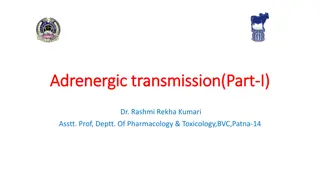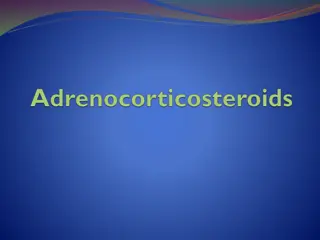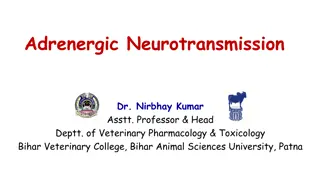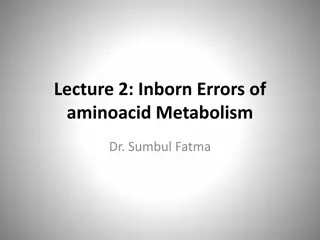Understanding Adrenergic Agents in Pharmaceutical Chemistry
Adrenergic agents play a crucial role in pharmacology by influencing the sympathetic nervous system through adrenergic receptors. These agents, such as sympathomimetics and sympatholytics, impact essential functions like cardiac activity, blood vessel dilation, and insulin release. Adrenergic neurot
0 views • 120 slides
Understanding Adrenergic Transmission and Catecholamine Synthesis
Adrenergic transmission involves the release of neurotransmitters such as norepinephrine, dopamine, and epinephrine at synapses or neuroeffector junctions. These neurotransmitters, known as catecholamines, play crucial roles in transmitting impulses in the sympathetic nervous system and central nerv
0 views • 14 slides
Understanding the Role of Corticosteroids in Adrenal Function
The adrenal gland consists of the cortex and the medulla, each responsible for secreting different hormones. The cortex produces glucocorticoids, mineralocorticoids, and adrenal androgens, while the medulla secretes catecholamines. Corticosteroids play a crucial role in regulating metabolism, stress
0 views • 18 slides
Understanding Adrenergic Neurotransmission in Veterinary Pharmacology
Adrenergic neurotransmission, mediated by norepinephrine, dopamine, and epinephrine, plays a crucial role in various physiological processes. This process involves synthesis, storage, release, and termination of catecholamines like norepinephrine and epinephrine. The intricate mechanisms of neurotra
0 views • 12 slides
Understanding Inborn Errors of Amino Acid Metabolism
Explore the world of inborn errors of amino acid metabolism through lectures by Dr. Sumbul Fatma. Discover conditions like Phenylketonuria (PKU), Maple Syrup Urine Disease, Albinism, and more, caused by enzyme deficiencies due to gene mutations. Learn about classical PKU, hyperphenylalaninemia, and
0 views • 25 slides
Understanding Adrenergic Agonists and Their Classification
Sympathomimetic amines like epinephrine, norepinephrine, isoproterenol, and dopamine are catecholamines with high potency but poor CNS penetration. Noncatecholamines like phenylephrine and ephedrine have longer half-lives. Learn about direct-acting, indirect-acting, and mixed-action adrenergic agoni
0 views • 25 slides





